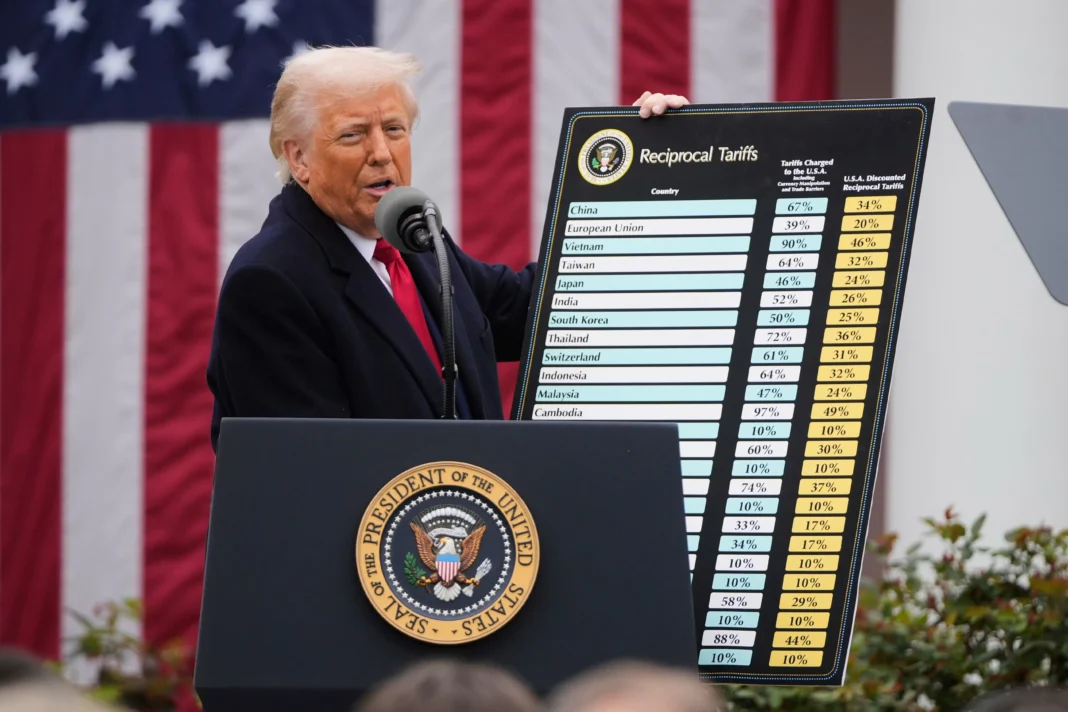In a move that has sparked widespread concern and uncertainty, US President Donald Trump announced his decision to impose new tariffs on imports from the UK during a press conference in the Rose Garden at the White House. The move has raised fears of a potential global trade war, with the UK government responding by putting Trump on notice that they could retaliate with their own tariffs on American imports.
On Wednesday, Trade Secretary Jonathan Reynolds announced that the government has launched a month-long consultation period in which British businesses are being asked to provide their input on what a retaliatory tariff on American imports would mean for them. This consultation period is set to end on May 1, after which the government will make a final decision on whether to implement higher tariffs on American products as a “last resort”.
It has been reported that the UK government has already prepared a list of 417 US products that could potentially be affected by these retaliatory tariffs. Trump’s announcement of a 10% tariff on UK imports, in addition to the 25% levy on cars and steel products that he has previously announced, has further escalated tensions between the two nations.
In response to the US president’s actions, Reynolds addressed the House of Commons, stating, “It remains our belief that the best route to economic stability for working people is a negotiated deal with the US that builds on our shared strengths. However, we do reserve the right to take any action we deem necessary if a deal is not secured.”
Labour leader Keir Starmer also addressed the situation, meeting with business leaders in Downing Street and reassuring them that “nothing is off the table” when it comes to the government’s response to Trump’s announcement. Starmer went on to affirm the government’s commitment to defending the UK’s national interest and striving to ensure economic stability for its citizens.
But not everyone is convinced by the government’s response. The Liberal Democrats have criticized the government for being “caught on the hop” by Trump’s announcement, with trade spokesperson Clive Jones stating, “This is work that should have been done as soon as Trump entered office and it appears ministers have been caught on the hop by this announcement.”
Jones went on to call for the UK to join forces with their Commonwealth and European allies in order to stand up against Trump’s actions and protect the country’s national interest. He also highlighted the need for the government to take a proactive approach in dealing with the situation, rather than just reacting to Trump’s decisions.
The government’s response to Trump’s tariffs has been met with mixed reactions, with some praising their efforts to protect the country’s economy and others criticizing their delay in taking action. Regardless, it is clear that this issue has the potential to greatly impact the UK’s trade relations with the US and the rest of the world.
Brexit has been a hot topic in the UK for years now, with many touting it as a way to secure better trade deals for the country. However, Trump’s tariffs have raised questions about the actual benefits of Brexit, with some arguing that it may have actually put the UK in a weaker position to negotiate with other countries.
One example of this is the recent news that Russian President Vladimir Putin has managed to avoid Trump’s tariffs, while Ukraine, a country that is not part of the EU, has not been able to do so. This has raised concerns about the potential repercussions of Brexit and the UK’s decision to leave the EU.
BBC presenter Nick Robinson has also pointed out the irony in the fact that the UK, which put so much emphasis on securing trade deals after Brexit, now finds itself in a vulnerable position due to Trump’s tariffs. It is clear that the UK will need to reassess its trade strategy and potentially seek out new alliances in order to navigate this challenging situation.
In the midst of all this uncertainty and chaos, it is important for the UK government to stay focused on protecting its national interests and the well-being of its citizens. It is not only about defending the country’s economy, but also about safeguarding the livelihoods of working people and ensuring a stable future for all.
The government has stated that they will continue to engage in negotiations with the US in order to reach a mutually beneficial deal. However, their firm stance on taking necessary action if a deal is not secured sends a strong message that they will not back down when it comes to protecting the UK’s national interests.
In the face of Trump’s aggressive trade policies, it is essential for the UK to stand firm and united.



